
We need a response to Covid-19 crafted alongside indigenous peoples
Ensuring the health of humanity and the planet requires a consolidated effort that acknowledges and incorporates the vision of those who have protected nature for so long. Español
by Alex McAnarney, Viviana KrsticevicThe onslaught of diseases like smallpox, and influenza brought by the European powers of the 15th century, combined with slavery and genocide, decimated indigenous populations throughout the Americas. Today, there are an estimated 826 indigenous groups in the region, with a total population of 45 million people. Sadly, the continued disregard for indigenous peoples in many governments’ responses to the novel coronavirus could place those left at the brink of extinction.
While already grappling with a paucity of language-accessible information and culturally-appropriate healthcare, many indigenous groups continue to deal with threats to their lands and livelihoods during this health crisis. In Brazil, deforestation in the Amazon is accelerating despite the pandemic. Meanwhile, COVID cases have increased, recently taking the life of an indigenous leader. In the cross-border Amazonian region of Colombia, Ecuador and Peru, for example, extractive industries continue to plunder the lush natural resources often found within and protected by native territories. Despite active quarantines in urban centers, the governments of all three countries have yet to issue moratoriums on extractive activities; with Ecuador and Colombia outright encouraging companies to drill for oil and gas to support their “essential contributions” to national economies.
Smaller enterprises such as illegal logging and mining also remain a threat, polluting waterways and destroying vital tree cover on large tracts of land. Meanwhile, illegal armed groups moving between Colombia and Ecuador have increased their presence across several reserves, trying to take over territory, engaging in aggressive confrontations with communities, and simultaneously putting indigenous peoples at higher risk of exposure to the virus.
Beyond the Amazon, other indigenous groups are yoked by inadequate responses to the pandemic. In Paraguay and Chile, groups are unable to fully utilize their territories and natural resources due to the threat posed by forestry and agribusiness plus the lack of basic resources like food and water. These factors are threatening their day to day capacity to enforce sanitary measures. For many of Chile’s Mapuche communities, the fact that transit continues throughout their territories led several groups to set up roadblocks, risking criminalization and possible contagion. In Nicaragua where State’s has been among the most lacking in the region, there is no information available on how COVID-19 is affecting the Miskito community and other marginalized indigenous groups along the Caribbean coast. Because many of them have faced consistent levels of violence from loggers and settlers as well as a lack of access to basic health and human services, the lack of response from the State makes their situation a ticking time bomb.
The mechanics of neglect and exposure vary from country to country. Throughout the region, the pandemic serves as a vivid reminder of the historic burden imposed since the first waves of colonization touched the shores of the American continent by pathogens, violence, and indifference towards indigenous populations.
Moreover, COVID-19 offers a glimpse into the future of what our world could end up looking like if environmental destruction is not taken seriously by governments. There is growing evidence that deforestation and biodiversity loss lead to the spread of zoonotic diseases. The most contemporary examples include HIV/AIDS, severe acute respiratory syndrome (SARS), Ebola, and COVID-19. If mechanisms are not put in place to end human encroachment on the natural world, pandemics borne from an inappropriate interaction between humans and wild animals could become a recurring phenomenon.
But there is hope: if we consider that 22-percent of indigenous territories hold nearly 80-percent of the world’s biodiversity, we can observe that indigenous peoples are critical to ensuring our planetary health. Frequently, they are the first line of defense against environmental destruction. In that sense, ensuring the health of humanity and the planet requires a consolidated effort that acknowledges and incorporates the vision of those who have protected nature for so long, while consciously addressing the disparities imposed upon them through centuries of racism, inequality, and greed.
Given this urgent need, the Center for Justice and International Law worked with several organizations and individuals representing communities from across the hemisphere to issue a series of recommendations to States that address the specific needs of indigenous communities, with full consideration of the needs of women, children and the elderly; their dietary needs and restrictions; their access to basic services like water, food, and healthcare; and whether they live in voluntary isolation, or not; as well as their cosmovision and pursuit of an existence lived in balance with nature and the environment.
Moving forward, governments and organizations must work with indigenous communities with the utmost urgency to develop regional and multilateral responses that consider the intersectional and differential needs within territories to address the pandemic and to prevent any future damage to the environment that could generate a similar health crisis. Their active participation is essential in the design of all medium and long term strategies to support their survival, limit deforestation, and foster a healthy environment, thereby strengthening pillars of our planetary health and the survival of humanity.